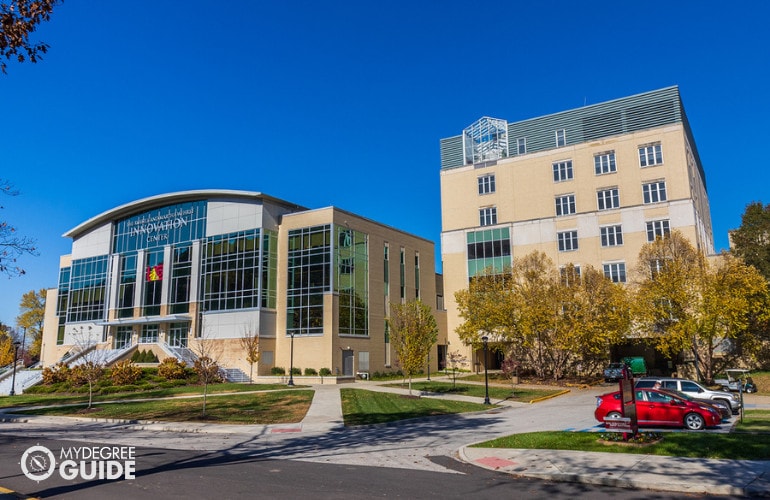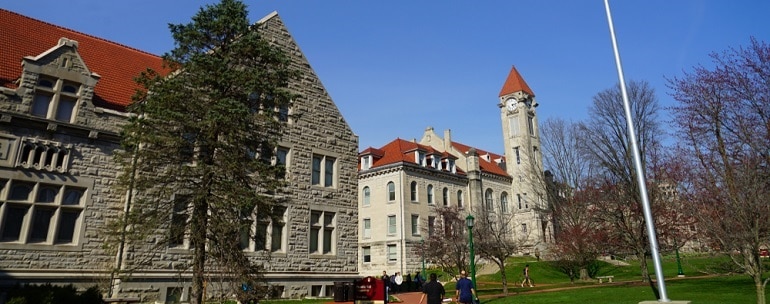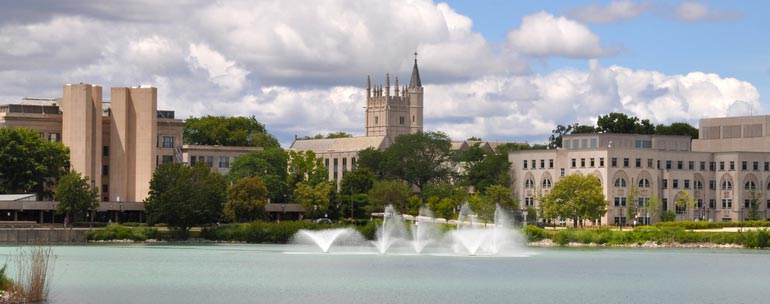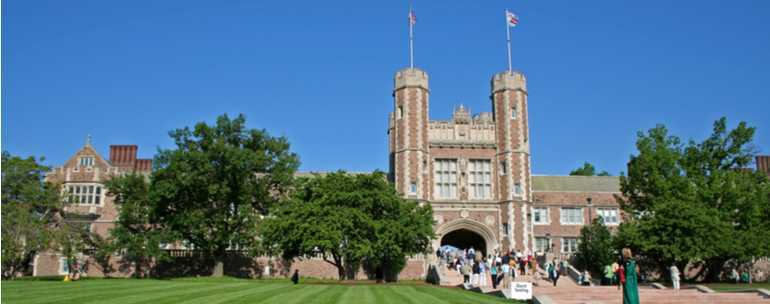Are you looking for the best psychology schools so you can make the most out of your undergraduate degree?

The best psychology schools have excellent credentials, a future-ready curriculum, and affordable tuition, with plenty of opportunities to help you prepare for a career.
Editorial Listing ShortCode:
After all, the skills taught in a psychology program are in-demand, and choosing the right school for you can make all the difference. Let’s take a look at what qualities make up the best psychology schools and explore what a psychology degree is all about.
Best Psychology Schools

Psychology is one of the most well-known undergraduate degrees, and a growing number of schools are offering it in both traditional and online formats.
Psychology programs are generally available either as a Bachelor of Arts (BA) or a Bachelor of Science (BS). Although BA and BS programs have very similar courses, BA programs are more oriented toward the humanities, while BS programs place more emphasis on research, math, and biology subjects.
Editorial Listing ShortCode:
Given all the schools offering psychology degrees, how do you known which ones are the best? Here are some important factors you can consider:
- Research achievements. The best colleges for psychology majors have a good track record with research, from prominent, published faculty to personalized guidance for students working on their theses.
- School credentials. Some psychology schools are especially prestigious. They may be known for specializing in a certain field, or they might receive positive reviews from guidance counselors, students, and review boards. The reputation of a school could help you make a stronger impression on both job and graduate school applications.
- Tuition costs. Good psychology schools balance quality of education with affordability. Tuition for a psychology undergraduate degree can range greatly. Online degree programs at in-state schools are often one of the most affordable options.
- Good graduation rates. The graduation rate refers to how many students end up finishing their psychology degree on time. This means at most 6 years for a standard 4 year program. A good graduation rate reflects positively on the program and implies that students found it worthwhile to finish.
Psychology is the scientific study of how people think, feel, and behave. Because of this, psychology programs across the country have a lot of overlap in their coursework. You’ll likely take classes on developmental psychology, abnormal psychology, statistics, and psychological assessment. Aside from these, you’ll typically have to complete an internship and work on a research thesis.
Many programs have electives and even specializations in tracks such as counseling psychology, industrial psychology, and research.
Types of Psychology Programs

Psychology undergraduate degrees are offered in different formats. Some programs follow a traditional, on-campus setup, while others have all of their classes online. Still others offer a hybrid of the two formats. Let’s look at the different types of psychology programs.
Traditional Psychology Colleges
Traditional psychology colleges are the most common all over the country. All classes happen on-site, consisting mostly of lectures as well as some laboratory work. You progress through most of your classes with a consistent group of peers.
A traditional psychology program often follows a semester or trimester format, with students required to attend classes at specific schedules every week. This format may be best for those who prefer structured learning and can commit most of their time to studying. Since this type of program is usually full-time, it generally takes around 4 years to finish.

Traditional psychology programs provide more access to facilities, and they can also be more interactive. They do tend to be less flexible than other types of programs, though.
Online, Hybrid, and Evening Psychology Colleges
If you’re hoping to have more control over your schedule, then online, hybrid, or evening psychology programs might be better suited for you.
Online and hybrid classes could be ideal for those who can’t study full-time or who would find it inconvenient to go to campus regularly. With an online psychology degree program, you’ll likely take most of your classes over video call or go through modules, such as recorded lectures, at your own pace.
Editorial Listing ShortCode:
On the other hand, many psychology programs come in a hybrid format. With a hybrid format, most of the classes may be online, but you might have to visit the campus occasionally for more hands-on work, such as laboratory activities. While evening psychology programs have their classes on-campus, the classes are all in the evening rather than in the daytime. This could be a beneficial arrangement if you’re busy or working during the day.
Whether you’re a working student, you have a family to take care of, or you live in a different state, online, hybrid, or evening programs can give you the flexibility you need. They tend to have lower tuition, too, since you’re not using the school’s facilities as much. On the other hand, these types of programs generally require you to be more self-motivated and comfortable with technology.
How to Choose a College with Good Psychology Program

Here’s a handy list of points to consider when searching for top universities for psychology:
- Program format. Consider what kind of program you’d want. Would you prefer a traditional college setup or an online or hybrid format? It can also be beneficial to take a look at the program requirements and schedule.
- Career goals. It’s beneficial to choose a program with specific classes related to the career that you’re interested in. You can also check faculty credentials to see if any of the staff are experts in your areas of interest.
- Student resources. Most psychology colleges require internships, whether in clinics, corporate companies, or research laboratories. Some may offer assistance with searching for an internship, or they may have linkages to organizations that can make it easier for you to get additional experience.
- Tuition. Undergraduate psychology programs have varying tuition costs. Some online programs cost less than on-campus programs, and studying at a school that’s in the same state where you live can often get you a discount. Finishing a program in less time will typically result in less tuition, even with the same number of credits being completed.
- School credentials. If you want a credible degree, it’s vital that the school that you choose for your psychology degree is accredited. You can also get a better idea of the school’s reputation by looking up the school’s alumni, the achievements of current students, or the awards won by the program or faculty.
Before committing to a program, you can run your options through all of these five factors so you can be sure you’re picking the best program for you.
Colleges of Psychology Admissions Requirements

When you’re applying for a psychology degree, you’ll typically have to submit these requirements:
- High school transcripts. College programs need to make sure that you graduated from high school, so they’ll ask for transcripts and a diploma or GED equivalent.
- Recommendation letters. Most psychology programs look for at least two references.
- Writing samples. You might have to submit an essay about why you’re interested in studying psychology.
- Test scores. Some programs will factor in your SAT or ACT scores. A growing number of schools no longer require standardized test scores, though.
You’ll also typically fill out an application form on the school website. Each school may require varying admissions criteria.
Colleges with Psychology Majors Accreditation

Whether you’re attending an online or in-person program, the top colleges for psychology hold regional accreditation. To ensure that colleges provide high-quality education across the country, there are peer review boards that set standards for colleges to fulfill. Schools that pass these standards are awarded accreditation.
Editorial Listing ShortCode:
Going to an accredited school has several benefits. For example, you’d be eligible to apply for government financial aid, and some employers place a higher value on degrees from accredited schools. To see whether a school is accredited or not, you can visit the US Department of Education’s website.
Financial Aid and Scholarships for Psychology Schooling

Given the rising costs of undergraduate degrees these days, most students receive some form of financial aid. You can apply for financial aid from the government through the Free Application for Federal Student Aid (FAFSA).
Most financial aid comes in the form of loans and grants. Loans can be obtained from the US government or from banks, but you’d be required to pay them back with interest after graduation. Grants don’t have to be repaid, but they’re usually given based on your level of financial need.
Scholarships are another option, although they’re especially competitive because they’re often merit-based. Some prominent scholarships are the National Institutes of Health (NIH) Undergraduate Scholarship and the Freemont Foundation Scholarship. Universities may have their own scholarships and financial aid packages available as well.
How to Know If Psychology Is Right for You

These questions can help you determine whether psychology would be a good fit for you:
- Does it fit with the career you want? Traditional psychology-related fields include mental health counseling, teaching, sales and marketing, and human resources.
- Are you curious about understanding people’s motivations, behavior, and feelings? This will be your main field of study in your psychology undergraduate degree.
- Does it align with your interests? When you look at the list of core classes for a psychology program, you’d ideally feel excited and motivated about taking them.
- Are you comfortable working closely with people? Many psychology-related roles involve either working closely with people or being part of a team.
- Do you consider yourself empathetic and a good listener? Aside from high-level concepts and research findings, psychology also puts a lot of focus on interpersonal skills.
If you can answer yes to these questions, then you might enjoy taking up psychology in college.
Is Psychology a Good Major?

Yes, psychology is a good major for many undergraduate students. It’s a popular degree track, mainly because it can lead to many career paths. The skills that you can learn with a psychology degree are essential to a wide variety of careers.
Psychology graduates can work in diverse fields, including social services, advertising and marketing, management, technology, and even media and journalism. According to the Bureau of Labor Statistics, two of the fastest-growing fields associated with a psychology degree are mental health counseling and market research.
What Is a Better Degree, a BA or BS in Psychology?
Here are some of the differences between a Bachelor of Arts (BA) and a Bachelor of Science (BS) in Psychology:
| BA in Psychology | BS in Psychology |
|
|
Whichever degree type is better for you depends on your own career goals and interests.
What Can You Do with a Psychology Degree?

Understanding other people well is a vital part of many careers, so a psychology degree can be advantageous in various industries.
For example, some psychology graduates become human resource specialists, public relations specialists, teachers, writers or journalists, social service workers, or market research analysts. A bachelors in psychology can also be a foundation for graduate studies. Some professionals earn their masters or doctorate to become licensed psychologists or counselors.
Editorial Listing ShortCode:
According to the Bureau of Labor Statistics, psychologists make a median annual wage of $81,040, which is much higher than the average wage. Alternatively, other professionals use their psychology degree to go on to law school or medical school.
How Long Does It Take to Get a Psychology Degree?
Whether you are pursuing an educational psychology degree on campus or a criminal psychology degree online, it generally takes 4 years to finish a bachelors degree in psychology if you’re studying full-time. Bachelor’s degrees on average require around 120 college credits, or around 40 classes. This applies to online bachelor degrees as well.
There are psychology programs that allow more flexibility, though, when it comes to scheduling. For programs that allow part-time study, it will often take longer to finish. On the other hand, programs that have shorter, 8 week semesters may allow you to finish faster if you study all year round.
Is Psychology a Hard Major?

A psychology undergraduate degree may be challenging for some, but many students find it doable, especially if they have an interest in the field. A psychology degree requires you to develop a wide knowledge base. Aside from learning about the major theories behind psychology, you’ll also learn about basic research and statistics.
Whether you’re taking a BA or a BS program, you’ll likely have classes on psychological assessment and study design, with some elements of biology. Throughout your program, you can also hone both your critical thinking and interpersonal skills so that you can apply psychology to real-world problems.
What Degree Do You Need to Be a Psychologist?

A psychologist is a highly trained professional who can practice therapy with clients, conduct studies, and write research papers. The degree you need to be a psychologist depends on your state.
In most states, a doctoral degree—such as a psychology PhD or a Doctor of Psychology ( PsyD)—is the minimum educational requirement for a licensed clinical psychologist. A Doctor of Education (EdD) or an Education Specialist (EdS) degree can also help professionals qualify for licensure as school psychologists.
Some states allow professionals with masters degrees to become industrial organizational psychologists. After you complete the educational criteria for your preferred role, you’ll typically undergo a supervised training period that involves around 1,500 to 2,000 hours. Once you meet your state board’s requirements, you can take a licensing exam.
Is a Psychology Degree Worth It?

Yes, a psychology degree is worth it for many students. Since a psychology degree trains you to understand people on a deeper level, it can be beneficial for careers that involve interpersonal communication.
For this reason, a psychology degree can be helpful in industries such as business, media, teaching, and human resources. Through a psychology program, you can also gain experience with interpreting research and working with data. These skill sets are highly applicable in the marketing field, another possible sector for psychology graduates.
Editorial Listing ShortCode:
According to the Bureau of Labor Statistics, many psychology-related fields are growing faster than average, including advertising, career counseling, and mental health counseling. A bachelors in psychology could also be a stepping stone to graduate school.
Best Universities Offering Bachelors in Psychology Degree Programs
Methodology: The following school list is in alphabetical order. To be included, a college or university must be regionally accredited and offer degree programs online or in a hybrid format.

Carnegie Mellon University offers both a Bachelor of Arts and a Bachelor of Science in Psychology. The Bachelor of Science degree requires two extra natural science courses. Otherwise, the requirements for both programs are the same. Applicants must submit official high school transcripts, standardized test scores, a teacher’s recommendation, and two writing samples.
Carnegie Mellon University is accredited by the Middle States Commission on Higher Education.

Columbia University offers an undergraduate degree in psychology. To graduate, students must obtain a minimum of a C- in every course tied to the major’s requirements. Those interested in the program may declare their major at any time during their studies. To be accepted into the school, applicants must submit official transcripts, test scores, and a teacher recommendation.
Columbia University is accredited by the Middle States Commission on Higher Education.

Duke University offers a Bachelor of Science in Psychology. Students must complete 16 courses related to the major, including a seminar, two independent studies courses, and a thesis. Those interested in the program must apply online with copies of their official transcripts, SAT or ACT test scores, three letters of recommendation, and admission essays.
Duke University is accredited by the Southern Association of Colleges and Schools Commission on Colleges.

Harvard University offers an undergraduate degree in psychology. Students must choose which track to follow: General, Cognitive Neuroscience and Evolutionary Psychology, Cognitive Science, or a secondary field in psychology. Applicants must submit an online application, SAT or ACT scores, and three letters of recommendation.
Harvard University is accredited by the New England Commission of Higher Education.

Indiana University—Bloomington offers both a Bachelor of Arts in Psychology and a Bachelor of Science in Psychology. Students may choose classes based on their interests. A final capstone project is needed to graduate. Applicants must have a high school diploma or the equivalent and submit official test scores and transcripts.
Indiana University – Bloomington is accredited by the Higher Learning Commission.

Massachusetts Institute of Technology offers a Bachelor of Science in Brain and Cognitive Sciences. Students must complete a minimum of 180 quarter credit hours to graduate. To be eligible for the program, applicants must submit an online application along with an admission essay, two letters of recommendation, and high school transcripts.
MIT is accredited by the New England Commission of Higher Education.

Northwestern University offers a Bachelor of Arts in Psychology. Applicants must submit an online application along with a statement of purpose, a current resume, and official transcripts from high school and any post-secondary institutions attended.
Northwestern University is accredited by the Higher Learning Commission.

Princeton University offers an undergraduate degree in psychology. To graduate, students must complete at least 8 courses within the psychology department. Students may also choose to complete independent study. To be eligible for the program, applicants must complete all prerequisite courses. Students may declare their major of concentration in their sophomore year.
Princeton University is accredited by the Middle States Commission on Higher Education.

Stanford University offers an undergraduate degree in psychology. Students in the program must choose one of six pathways.
Options are Cognitive Science, Health Psychology, Judgment and Decision-Making, Early Childhood Cognition, Learning, and Development, Mind, Culture, and Society, or Neuroscience. Those interested in the program must submit an online application, ACT or SAT scores, three letters of recommendation, and official transcripts.
Stanford is accredited by the Western Association of Schools and Colleges Senior College and University Commission.

The University of California—Berkeley offers a Bachelor of Arts in Psychology. To graduate, students must complete all required credit hours with a minimum GPA of 2.0. To be eligible for the program, applicants must have a GPA of 3.0 or higher. ACT or SAT test scores are not required but may be submitted to meet other requirements.
The University of California – Berkeley is accredited by the Western Association of Schools & Colleges.

The University of Chicago offers an undergraduate degree in psychology. Students must complete 120 units to graduate. Placement tests may be used to obtain credits. Those interested in the program must submit an online application along with an admission essay, official transcripts, and two teacher evaluations.
The University of Chicago is accredited by the Higher Learning Commission.

The University of Illinois—Urbana-Champaign offers a Bachelor of Science in Psychology. Students must choose one of several concentrations, such as Clinical Psychology, Community Psychology, or Diversity Science. Applicants must submit official high school transcripts, ACT or SAT test scores, and an admission essay.
The University of Illinois at Urbana-Champaign is accredited by the Higher Learning Commission.

The University of Michigan—Ann Arbor offers an undergraduate degree in psychology. Students may choose between two areas of study: Psychology or Biopsychology, Cognition, and Neuroscience. Students must complete 120 credit hours with a minimum GPA of 2.0 to graduate. Applicants must submit an online application along with copies of their high school transcripts.
The University of Michigan – Ann Arbor is accredited by the Higher Learning Commission of North Central Association of Colleges and Schools.

The University of Minnesota offers a Bachelor of Science in Psychology. To graduate, students must complete a total of 120 credit hours. Those interested in the program must submit an online application and a self-reported academic record. The major may be declared by submitting the Online Declaration Module after completing all prerequisite courses.
The University of Minnesota is accredited by the Higher Learning Commission.

The University of North Carolina—Chapel Hill offers a Bachelor of Science in Psychology. Students must complete 120 credit hours and have a minimum GPA of 2.0 to graduate. To be eligible for the program, applicants must submit an online application along with a personal essay, 2 short answer responses, official transcripts, and a letter of recommendation.
UNC Chapel-Hill is accredited by the Southern Association of Colleges and Schools Commission on Colleges.

The University of Pennsylvania offers a Bachelor of Arts in Psychology. Students must maintain a GPA of 2.0 or higher to graduate. Those interested in the program may declare the major in their sophomore year after meeting with a pre-major advisor and an undergraduate coordinator.
The University of Pennsylvania is accredited by the Middle States Commission on Higher Education.

The University of Texas—Austin offers a Bachelor of Science in Psychology. To graduate, students must complete 120 credit hours to graduate. Those interested in the program must submit an online application along with copies of their high school transcripts, an application essay, and completed short answer questions.
The University of Texas at Austin is accredited by the Southern Association of Colleges and Schools Commission on Colleges.

The University of Wisconsin—Madison offers a Bachelor of Arts in Psychology. To graduate, students must complete 120 credit hours within 4 years. Applicants must submit an online application along with two admission essays, a letter of recommendation, and copies of their official high school transcripts.
The University of Wisconsin – Madison is accredited by the Higher Learning Commission.

Washington University offers a Bachelor of Science in Psychological and Brain Science. Students may complete both an independent study and an internship. To graduate, students must maintain a GPA of 2.0 or higher and have grades that are C- or higher in all courses. Applicants must submit official transcripts and a personal essay when applying.
Washington University is accredited by the Higher Learning Commission.

Yale University offers both a Bachelor of Science and a Bachelor of Arts in Psychology. Both programs typically take 8 full terms of study to complete. Applicants must submit three letters of recommendation, official transcripts, a school report, SAT or ACT test scores, and a mid-year report.
Yale University is accredited by the New England Commission of Higher Education.
Finding the Best Psychology Colleges Online

Studying psychology can open you up to many opportunities. Some graduates go on to work in business or counseling, while others go on to study for their masters.
If you select course electives or a degree concentration, you can even receive specialized training in your desired area of study before you graduate. When searching for a psychology degree program, there are many options to choose from. A growing number of accredited schools are offering online or hybrid programs as well as traditional, on-campus programs.
Regardless of which learning method is best for you, there are many good schools for psychology that you can explore. The sooner you find the school and program that best align with your goals and interests, the sooner you can start your educational journey in psychology.

